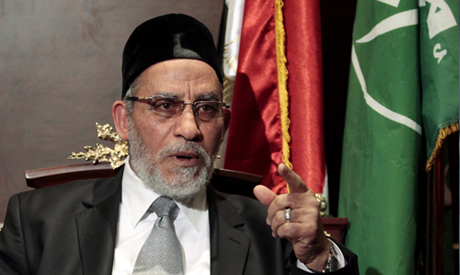by Ahram Online
Experts disagree on legal ramifications of Monday's verdict banning all activities of Egypt's 85-year-old Islamist group

Muslim
Brotherhood leader Mohamed Badie talks during an interview with Reuters
in Cairo, in this February 7, 2012 (Photo: Reuters)
A Monday court verdict banning “all activities” by the Muslim Brotherhood will be cancelled on appeal, Brotherhood figure Mohamed Tosson stated on Monday evening.
The verdict was not released by a court with the jurisdiction to make such a judgement, Tosson, who is secretary-general of the lawyers’ syndicate, told Al-Ahram Arabic news website.
The court that made the verdict is the court of urgent matters. Tosson said that in order for the verdict to be enforceable, it must be announced by the administrative court.
Senior Brotherhood figure Mohamed Ali Bishr had announced that the group will appeal the verdict, which banned "all activities of the group and any organisation derived from it."
The court also ordered the interim government to seize the group's funds and establish a panel to administer its frozen assets until any appeal is heard.
However, Tosson said that the verdict cannot include the group's Freedom and Justice Party (FJP), arguing that legal affairs related to the party follow a different legal track than that of the group.
Conversely, constitutional law expert Yasser El-Hodaiby asserted in a separate statement to Al-Ahram Arabic that any verdict issued by the court of urgent matters is enforceable even if it is followed by appeals.
Tosson, however, argues that the possibility of appeals is another reason the verdict is not enforceable, adding that the group's funds and property cannot yet be confiscated.
Most non-Islamist political forces and groups welcomed Monday’s court verdict, which comes nearly three months after the ouster of the Brotherhood’s Mohamed Morsi from the presidency.
"This verdict came very late," said spokesman for the Free Front for Peaceful Change, Essam El-Sherif. "The Brotherhood, after rising to power, became a threat to national security and a danger to society."
The 85-year-old group existed without legal standing for decades and was only officially registered as an NGO in March 2013.
Monday’s verdict is not the only challenge to the Islamist group's existence.
On 2 September, Egypt's State Commissioners Authority, a body that advises the government on legal issues, recommended the Brotherhood's dissolution after claims circulated of its links to armed militias.
The authority’s recommendations - which are non-binding - were made in accordance with Law 84 of 2002, which prohibits non-governmental organisations and institutions from forming paramilitary wings.
Egyptian authorities launched a crackdown against the Brotherhood following the ouster of president Mohamed Morsi, who hails from the group, in July.
The group's Supreme Guide, Mohamed Badie, Deputy Supreme Guide Khairat El-Shater, and senior member Mohamed El-Beltagy are among dozens of high and mid-level Brotherhood leaders who have been detained on charges of inciting violence.
Egyptian prosecutors froze the assets of several senior Brotherhood leaders and other prominent Islamists in July as part of investigations into the incitement of violence at protests.
Ahram Online
Source: http://english.ahram.org.eg/NewsContentP/1/82344/Egypt/Implications-of-Brotherhood-ban-verdict-uncertain.aspx
Copyright - Original materials copyright (c) by the authors.
No comments:
Post a Comment